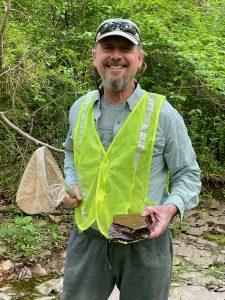How It Works
Employers in all sectors value a credential that speaks to your skills as a professional. Certification through ESA is a way for ecologists at all levels of education and training to add a credential to their resume, demonstrate their expertise, and exhibit their skill to potential employers, clients, or colleagues.
Earning a certification from ESA isn’t a one-time, set-and-forget kind of thing; our program seeks to involve certified ecologists of all career fields in the work of the Society. We offer networking, ample professional development, opportunities to mentor or be mentored, as well as much as we can provide to help you succeed in your career. And we’re always open to suggestions!
 “As an aspiring marine biologist, it is important to me to develop interdisciplinary skills to better manage the environmental challenges we face in today’s world. I chose to be certified to establish my scientific credibility and demonstrate within the science community and society that I have developed the necessary education, skills, and experience required to apply ecological principles to my professional career.
“As an aspiring marine biologist, it is important to me to develop interdisciplinary skills to better manage the environmental challenges we face in today’s world. I chose to be certified to establish my scientific credibility and demonstrate within the science community and society that I have developed the necessary education, skills, and experience required to apply ecological principles to my professional career.
— Arona Bender, Certified Ecologist in Training
The Application
Our efforts to improve the certification program continue! We’re now accepting rolling applications with no fixed due date. You are free to begin an application at any time and complete it at any time — just expect to get reminder emails from us until you submit!
We strive to make application easy and standard across all levels — this page lists the materials you’ll need, and you should check this primer on the application for guidance.
Applications that are missing letters of recommendation are considered incomplete until both letters have been received. Please note that letters or any other missing documentation must be sent within 6 months since the application was submitted or the application will be rejected. If extenuating circumstances arise, please send an email to cert@nullesa.org
Fees to Apply
We strive to make sure that our certification is one that’s affordable to get, especially for people early in their careers. ESA members enjoy significant savings.
Please note that the fees will change starting August 1, 2024.
Current Fees (until July 31, 2024):
| Certification Level (new applications and upgrades) | ESA Member | Non-Member |
| Ecologist in Training (EiT) | $0 | $25 |
| Associate Ecologist (CAE) | $25 | $55 |
| Ecologist (CE) | $110 | $225 |
| Ecologist Emeriti (CEE) | $110 | $225 |
| Senior Ecologist (CSE) | $175 | $350 |
| Senior Ecologist Emeriti (SEE) | $175 | $350 |
| Recertifications at all levels* | $25 | $50 |
* This applies only for recertifications before or during the 2-year grace period. Please see the Recertification section for more information.
Updated Fees (effective August 1, 2024):
| Certification Level | (New applications and upgrades have the same fee) | |
| Ecologist in Training (EiT) | ESA Member | $0 |
| Non-Member | $40 | |
| Recertification (Member) | $25 | |
| Recertification (Non-Member) | $50 | |
| Associate Ecologist (CAE) | ESA Member | $50 |
| Non-Member | $150 | |
| Recertification (Member) | $25 | |
| Recertification (Non-Member) | $50 | |
| Ecologist (CE) | ESA Member | $160 |
| Non-Member | $330 | |
| Recertification (Member) | $160 | |
| Recertification (Non-Member) | $330 | |
| Senior Ecologist (CSE) | ESA Member | $193 |
| Non-Member | $368 | |
| Recertification (Member) | $193 | |
| Recertification (Non-Member) | $368 | |
| Certified Ecologist Emeriti (CEE) | ESA Member | $160 |
| Non-Member | $330 | |
| Senior Ecologist Emeriti (SEE) | ESA Member | $200 |
| Non-Member | $400 | |
The Review Process
Reviews will likewise be conducted on a rolling basis. Expect to hear from us no more than 60 days from the date of your application, and likely much sooner.
In some cases, an application will require clarification or escalation to review by our Board of Professional Certification. In the case that you are asked to provide more information, we request an acknowledgment within 30 days, and that requested materials be submitted within 90 days of the original date of the request. In instances of escalation, our Board will be reviewing on a roughly monthly basis, so outcomes will likewise be shared within 60 days of that escalation. There may be some instances that require a full review of the full Board, in which case some additional delay may occur, but staff will communicate the status of all applications as regularly and thoroughly as possible.
Applications that are missing letters of recommendation are considered incomplete until both letters have been received. Letters or any other missing documentation must be sent within 6 months since the application was submitted or the application will be rejected.
 “Being certified as a senior ecologist by ESA for over 15 years has provided me with a unique level of credibility and achievement in the field of ecology. This certification not only demonstrates my expertise but also assures the individuals I work with that I have met the rigorous standards endorsed by a national professional body. It serves as a testament to my level of education and professional experience, which is invaluable in establishing trust within the science community and society at large.”
“Being certified as a senior ecologist by ESA for over 15 years has provided me with a unique level of credibility and achievement in the field of ecology. This certification not only demonstrates my expertise but also assures the individuals I work with that I have met the rigorous standards endorsed by a national professional body. It serves as a testament to my level of education and professional experience, which is invaluable in establishing trust within the science community and society at large.”
— Kris D. Hallinger, Certified Senior Ecologist
Appeals Procedure
A decision of the Board of Professional Certification may be appealed in writing to the ESA executive director, who will initiate the appeals process through the ESA Professional Ethics and Appeals Committee. The Board of Professional Certification may be engaged in discussion of a potential appeal prior to its official submission to the PEAC.
Next Steps
A certification from ESA is good for 5 years, with a 2-year grace period in which you may still recertify or upgrade without going through the application process anew (but your CEU still need to have been accrued within 5 years of your recertification or upgrade date, and your certification will be retroactive to what would have been the original renewal date). If your certification expired more than two years ago, you may apply for recertification, but will be charged a penalty fee.
Certifications will be dated retroactively to the first day of the month that the application was approved and run until the last day of the preceding month 5 years hence. Holders of certifications from the old system will keep their June 30 expiration dates unless they opt to recertify or upgrade earlier in the calendar (and are encouraged to do so).
If you’ve completed the steps necessary to upgrade before the 5 years are up, you’re free to apply to upgrade when you’re ready. This can include a new degree or crossing an experience threshold. Your CEU clock resets if you upgrade early.
Support
ESA is invested in the career success of all ecologists, and this certification program is well-supported within the Member Services Office. From the day you think about applying, you have access to program staff who work hard to make managing your professional development easy and to earn important industry credibility for your credentials.
You’ll receive newsletters, be on our listserv, be invited to networking and feedback events both virtually and at ESA events like the Annual Meeting. Your input will be sought on program enhancements. And if you join, you’ll have opportunities to volunteer within the Society in various ways, from committees to sections to the Council and Governing Board. We want you to succeed.
If you need anything, get in touch with us at cert@nullesa.org. The staff and Board of Professional Certification will do everything they can to help.
Continuing Education
If your ESA Certification or recertification was last approved in 2021 or after, you are required to complete 44 continuing education units during the 5 years of your certification. Ecologists that were newly certified or recertified before 2021 do not need to self-report CEUs until their next recertification. Beginning in 2026, all recertifications and upgrades will require meeting the CEU requirements.
You will report your CEU directly in our membership system, which ensures clean records. You can earn CEU by participating in various ESA functions (from the Annual Meeting to leadership to webinars), but you are also required to include activities hosted by other organizations. This is to ensure that any certified ecologist’s professional development fits their professional needs.
Once you’re certified, you will be included on our dedicated listserv for certified ecologists and will receive a regular newsletter. Both will list continuing education opportunities, from both ESA and our approved providers, and invite you to participate in networking and feedback opportunities. We organize meetups, plus scientific and technical opportunities for certified ecologists, at the Annual Meeting and always encourage certified ecologists to submit proposals and abstracts for those events and any others that ESA holds. We also encourage certified ecologists to join the Society and seek leadership opportunities in committees and task forces, sections and chapters, and the Board of Professional Certification and Governing Board. This is part of ESA’s commitment to Extend the Tent and be the quality professional home of all ecologists, regardless of career field and level.
Disciplinary Procedure
The Board of Professional Certification, with approval of the Professional Ethics and Appeals Committee, shall have the authority to censure a certification, to suspend certification for a stated period, or to revoke certification on the finding that an individual has willfully violated the Code of Ethics or misrepresented the facts at the time of certification. Such a finding may be reached by concluding that an allegation of improper deportment is true. Such an allegation may be presented to the Board in writing, by any member of the Ecological Society of America. Anonymous allegations will not be entertained. Anyone named a party to such proceeding shall be informed in a timely manner of the evidence brought forward and be given an opportunity to respond to the allegations.
The Board will forward all material to the Professional Ethics and Appeals Committee. After review of the case by the Committee and the Board, the Board will render a written decision informing the certified ecologist, the individual who initiated the allegation, and the Governing Board. Any such action of the Board may be appealed to the Governing Board, whose decision will be final.